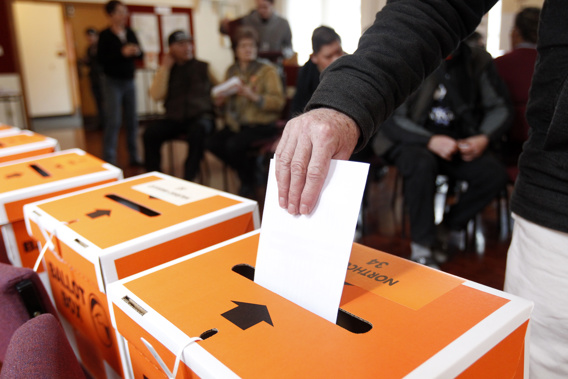
The Government will consider reverting the rules to requiring voting enrolment before election day, after the auditor general's investigation into last year’s counting errors found numerous system mistakes.
According to the report, final checks of the votes cast in October were rushed and ineffective, while multiple errors within the actual results were overlooked entirely. These mistakes compounded the three-week period it took to count and finalise special votes.
The Electoral Commission said it was "deeply disappointed" with the report's findings.
Talking to Heather Du Plessis-Allan Drive yesterday afternoon, chief electoral officer Karl Le Quesne said none of the mistakes changed the election's ultimate results.
"We've investigated [the mistakes] and looked at it electorate by electorate, they would not have changed the result in any electorate or the allocation of list seats," he told Newstalk ZB.
"There was a very small number of [vote count mistakes], but they should have been extracted from the actual count."
Le Quesne pointed to a law changed passed by the former Labour Government that allowed people to enrol for voting on election day itself as the reason errors were so prevalent during the election.
He said this resulted in a high number of last-minute enrolments - 46 per cent more than in 2020. This was on top of 600,000 special votes, which put electoral staff and their systems under "incredible pressure".
As a result of worker fatigue and systemic hiccups, Le Quesne said, quality assurance checks needed to be strengthened and staff needed to be supported.
"We've got an audit going on looking at both our post-election processes and our enrolment processes to make sure we've got everything covered and see if there's any gaps. We've got our training, and operations manuals will be providing more support during the official count," he said.
Du Plessis-Allan asked if staff were just counting the results badly and putting results in the wrong columns, but Le Quesne said it was more the staffing systems.

"What we found was [staff] transposed some of the results from a paper sheet where they recorded it into our system, and they didn't go and do a double check to make sure they didn't enter the data correctly," he said.
“So it wasn't counting correctly, most of it was data entry."
Justice Minister Paul Goldsmith spoke with the Mike Hosking Breakfast about the rules that Labour introduced allowing late election enrolment and was asked if the former Government simply did not hire the manpower to facilitate the changes.
Goldsmith agreed, claiming New Zealand was one of the few countries that allowed such late enrolment and echoed the enormous pressure on the voting systems.
Hosking asked if Labour had the foresight to predict these problems.
"Well, they were warned, but that was their approach - they were so determined to do what they wanted to do and didn't think through the second-order consequences," said Goldsmith.
"So, you know, every three-year cycle there will be a law to review the [election rules] and we'll be making some changes."
Hosking asked if this included rolling back the rules to force earlier enrolment for voting.
"We're seriously looking at that, that's one of the real pressure points. Most places you need to enrol before the election so people can get the systems organised, and you can have a better chance of avoiding the sort of mistakes that we've seen."
The minister also alluded to the auditor general's observations that some electoral staff were new and did not know what they were doing,
"There's basic administrative stuff that needs to be improved," said Goldsmith.
"And you know, to its credit, the electoral commission accepted that and they were gonna make changes. But the system itself is designed to make it difficult to achieve success without spending colossal sums of money - we already spend more than $200 million for the three-year cycle, and the solution can't be to just make the system more complex and spend even more hundreds of millions of dollars to do an election, it's actually to simplify it."
Political commentator Paul Duncan agreed with Hosking that the more accessible democracy is, the more people will participate.
"I think one of the good things about our electoral commission is they really do bend over backwards and, generally, post-election voter satisfaction surveys get really high ratings from voters," he said.
"But it's one of those things where if they really wanted to run a good election and make it really accessible, we've got to provide the staff, we've got to pay for it. So it's one area we can't skimp on."
Duncan said whether a party wins or loses, it is important to have high trust in the electoral process to back the result.
"On election night, when [Labour leader] Chris Hipkins graciously conceded defeat, he was able to do that because he had a fundamental confidence in the result. And if we start to fall down in this job we get into problems."
Take your Radio, Podcasts and Music with you









